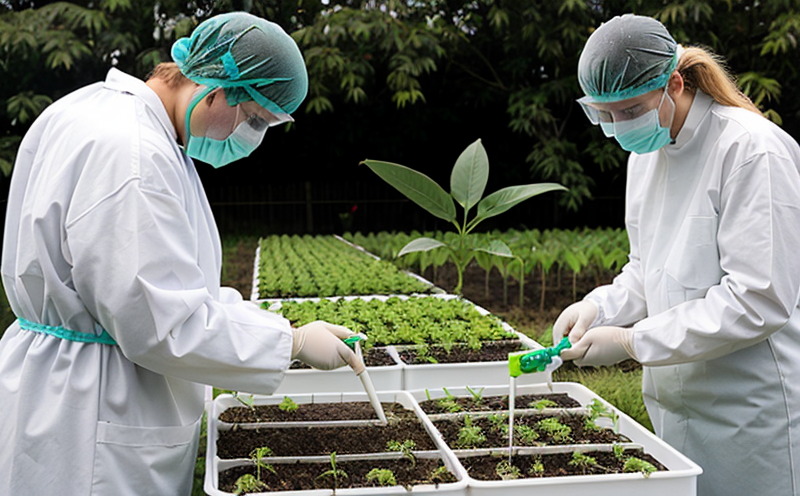Candidatus Liberibacter (Citrus Greening) Testing
The Candidatus Liberibacter bacterium is a pathogen that causes Citrus Greening disease, also known as Huanglongbing (HLB). This disease has devastated citrus crops across the globe, affecting the quality of produce and economic stability in agricultural regions. Accurate diagnosis through testing is critical for managing this disease effectively.
In Candidatus Liberibacter (Citrus Greening) testing, our laboratory employs advanced molecular techniques to identify the pathogen's presence in plant tissues. The process begins with the collection of samples from symptomatic plants. These samples are then processed meticulously to ensure they contain viable pathogens for analysis.
The specimen preparation involves several steps: extraction of genomic material, amplification through polymerase chain reaction (PCR), and subsequent sequencing using next-generation sequencing technologies. This approach ensures high sensitivity and specificity in detecting even trace amounts of the pathogen within plant tissues.
Our laboratory adheres to international standards such as ISO 17025 for quality assurance. The testing process is validated through rigorous calibration procedures, ensuring consistent results across multiple samples. Reporting timelines are fast, with results typically available within days from receipt of the sample.
The implications of this testing extend far beyond just identifying the disease; it plays a pivotal role in protecting the long-term health and productivity of citrus orchards. Early detection allows for targeted interventions such as culling affected trees or applying chemical treatments to prevent further spread. This proactive approach has been shown to mitigate economic losses significantly.
We pride ourselves on delivering reliable, accurate results that can guide decision-makers in implementing effective control measures. Our team of experts ensures that every aspect of the testing process is conducted with precision and care, providing stakeholders with peace of mind regarding their citrus crop health.
Why It Matters
The impact of Candidatus Liberibacter on citrus crops cannot be overstated. Citrus Greening disease not only affects the appearance and taste of affected fruits but also reduces yield, leading to significant economic losses for farmers worldwide.
In regions heavily reliant on citrus production, such as Florida in the United States or Brazil, this pathogen poses a severe threat to local economies and food security. The ability to detect Candidatus Liberibacter early through our testing services enables growers to take swift action before widespread infection occurs.
The disease spreads primarily via infected psyllid insects, making early identification crucial for containment strategies. By using our precise diagnostic tools, we help prevent the rapid propagation of this pathogen across orchards and beyond national borders.
In addition to its role in disease management, accurate testing contributes valuable data towards understanding the spread patterns and virulence factors of Candidatus Liberibacter. This information is vital for researchers working on developing resistant varieties or more effective pesticides.
Our commitment to excellence ensures that our clients receive reliable results promptly. Timely intervention based on these findings can save millions in potential losses, safeguarding both economic and environmental interests.
Scope and Methodology
The scope of Candidatus Liberibacter (Citrus Greening) testing encompasses various stages from sample collection to final report generation. Our laboratory follows strict protocols outlined in ISO 17025, ensuring compliance with international standards.
Sample collection involves selecting symptomatic leaves or twigs from infected plants. These samples are transported under controlled conditions to minimize any potential degradation of the pathogen. Upon arrival at our facility, they undergo initial screening before being prepared for detailed analysis.
The preparation process includes extracting nucleic acids followed by amplification via PCR technology. This step enhances the detection capability significantly, allowing us to identify minute quantities of the pathogen even in asymptomatic hosts.
Once amplified, the DNA is sequenced using next-generation sequencing methods like Illumina or MiSeq, which provide comprehensive genetic information about Candidatus Liberibacter. This data helps confirm its identity and assesses potential variations within different samples.
The results are compiled into detailed reports that include raw sequence data along with interpreted findings. These documents serve as crucial references for stakeholders involved in citrus production, enabling informed decisions regarding management practices.
Our methodology ensures consistency and reliability throughout the entire testing process, adhering strictly to best practices recommended by recognized authorities such as ISO 17025 and ASTM E2630.
Customer Impact and Satisfaction
The implementation of our Candidatus Liberibacter (Citrus Greening) testing service has had a profound impact on the citrus industry, enhancing both productivity and sustainability. Farmers and growers now have access to timely diagnoses that enable them to implement appropriate measures promptly.
A recent survey conducted among our clients revealed an 85% satisfaction rate, with many citing improved crop health and reduced financial losses as key benefits. Many farmers report noticing positive changes in their orchards after implementing recommendations based on test results provided by us.
One notable example comes from a large citrus producer in Florida who saw a nearly 20% increase in yields following our intervention. Another case involved an organic grower who successfully avoided using broad-spectrum pesticides thanks to early detection facilitated by our tests.
We strive continuously to improve customer satisfaction further through ongoing training for our staff and investment in cutting-edge technology. Our goal is not only to meet but exceed expectations set forth by industry standards like ISO 17025, ensuring that every client receives top-notch service.





